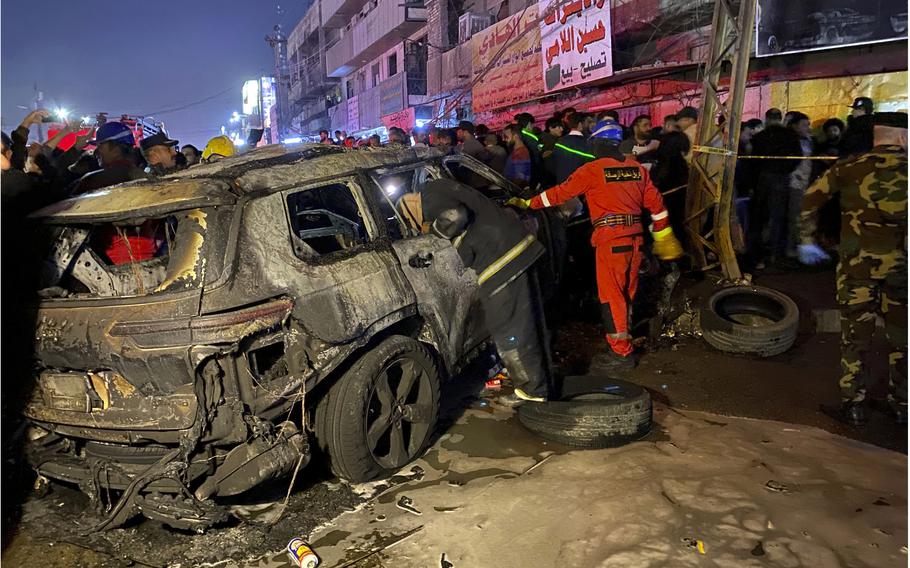
Civil defense members gather at the site of a burned vehicle targeted by a U.S. drone strike in east Baghdad, Iraq, on Feb. 7, 2024. (Hadi Mizban/AP)
A U.S. drone strike in Baghdad on Wednesday killed three members of the Kataib Hezbollah militia, including a high-ranking commander, responsible for planning and participating in attacks against American forces in the region, military officials said.
“There are no indications of collateral damage or civilian casualties at this time,” according to U.S. Central Command, which is responsible for American military operations in the Middle East. “The United States will continue to take necessary action to protect our people. We will not hesitate to hold responsible all those who threaten our forces’ safety.”
The attack occurred at about 9:30 p.m. local time. The three Kataib Hezbollah members were in a car when the strike occurred. Two officials with Iran-backed militias in Iraq said one of the three killed was Wissam Mohammed “Abu Bakr” al-Saadi, the commander in charge of Kataib Hezbollah’s operations in Syria.
The strike follows a barrage of U.S. strikes in Syria and Iraq on Friday in response to a Jan. 28 militant drone attack on a U.S. base in Jordan that killed three American soldiers.
The retaliatory U.S. strikes attacked three facilities in Iraq and four in Syria hitting more than 85 targets, U.S. officials said.
U.S. and British forces on Saturday also conducted strikes against 36 militia targets in Yemen in a continued effort to stop attacks on the shipping lanes in the Red Sea by Iran-backed Houthi rebels.
National Security Council spokesman John Kirby said last week that the U.S. believes the attack on Tower 22 — the U.S. base in Jordan — was planned, resourced and facilitated by the Islamic Resistance in Iraq, an umbrella group that includes Kataib Hezbollah.
The Islamic Resistance in Iraq has regularly claimed strikes on bases housing U.S. troops in Iraq and Syria since the Israel-Hamas war started in October, saying they are in retaliation for American support of Israel, according to the Health Ministry in Gaza, the Hamas-run territory. Kataib Hezbollah had said in a statement that it was suspending attacks on American troops to avoid “embarrassing the Iraqi government” after the strike in Jordan, but others have vowed to continue fighting.
On Sunday, the Islamic Resistance in Iraq claimed a drone attack on a base housing U.S. troops in eastern Syria that killed six fighters from the Syrian Democratic Forces, a Kurdish-led group allied with the United States.
U.S. officials, including Kirby and Defense Secretary Lloyd Austin, said last week before the U.S. airstrikes on Friday that there will be a multi-tiered response to the attack that killed the three U.S. soldiers.
Air Force Maj. Gen. Pat Ryder, the Pentagon’s top spokesman, said Monday that the Defense Department assessed the strikes had “good effects,” but few details have been provided, citing ongoing battle-damage assessments.
“Our responses are not complete,” Ryder said. “I’m not going to telegraph, or discuss, what that may be other than we’ll come back to that at a time of our choosing.”
The Associated Press contributed to this report.